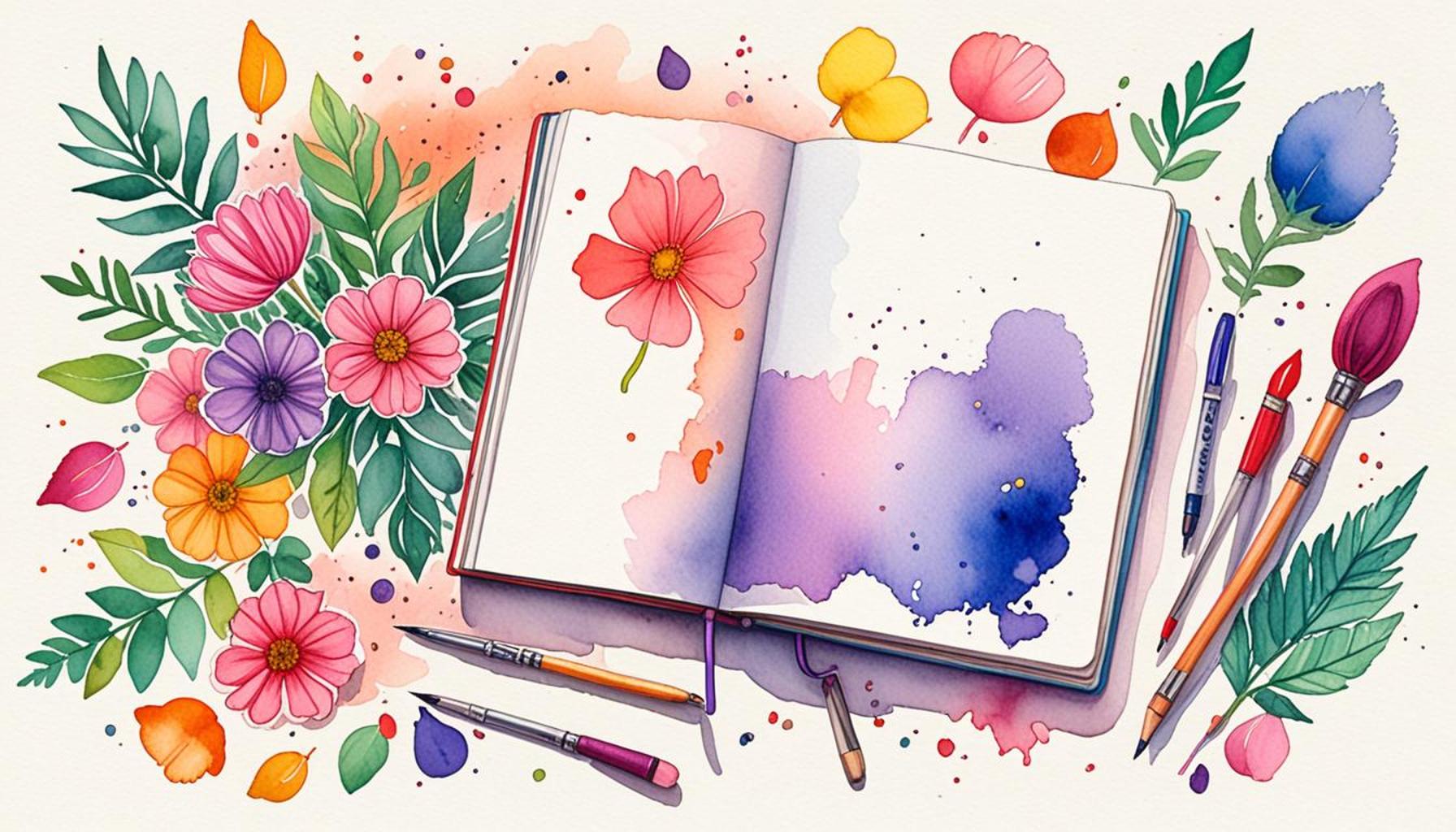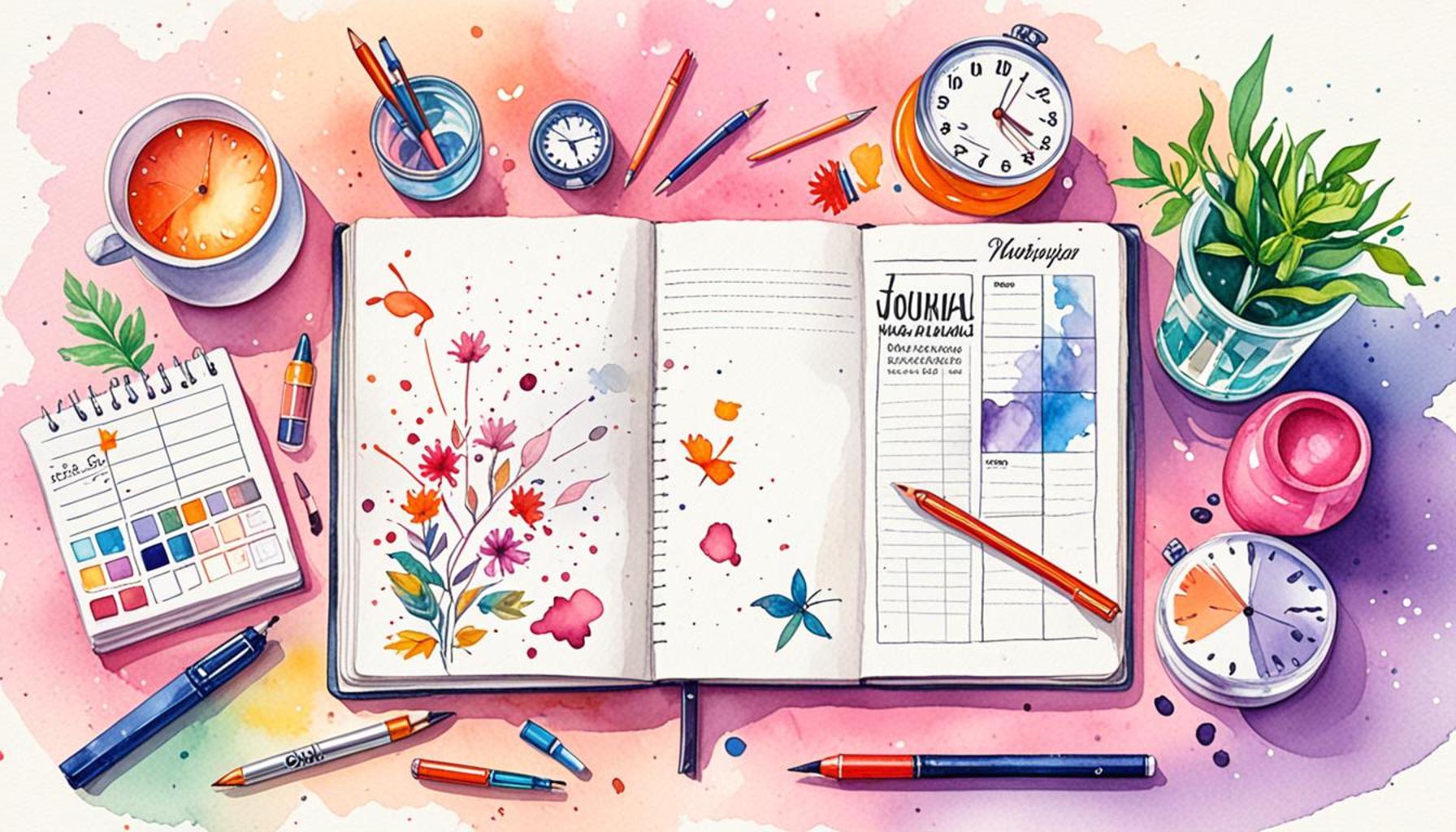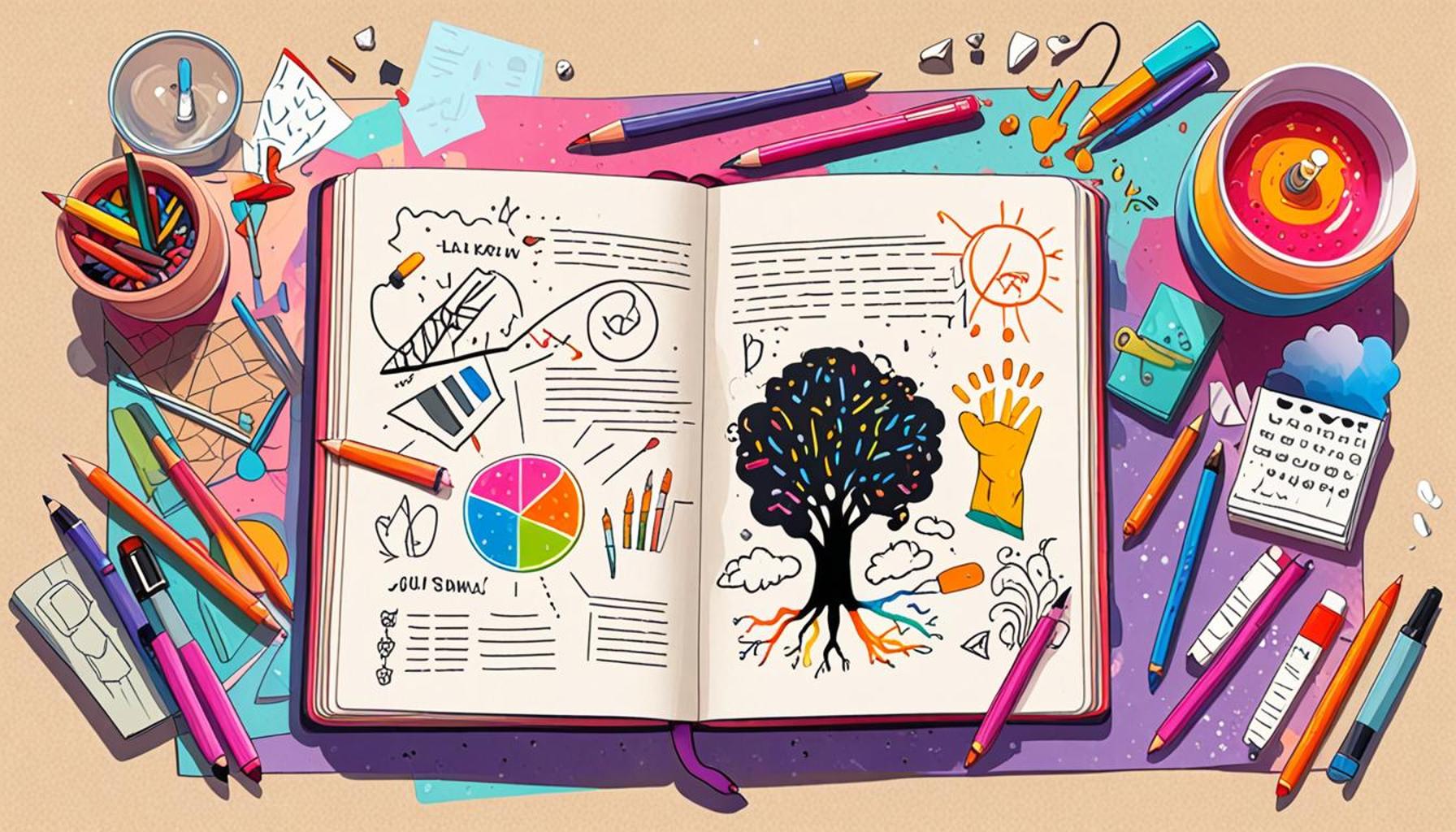Reflective Diary as a Tool to Promote Empathy and Interpersonal Understanding

The Benefits of Keeping a Reflective Diary
In an era characterized by rapid change and increasing complexity in human interactions, the power of personal reflection has not lost its significance. One profound manner in which individuals can connect on deeper levels is through the practice of maintaining a reflective diary. This tool is much more than a mere journaling exercise; it serves as a pathway to heightened empathy and enhanced interpersonal understanding across diverse contexts.
Reflective diaries empower individuals to document their thoughts and emotions, creating a safe space for introspection. Engaging with this process can yield numerous advantages:
- Encourages self-reflection and personal growth: Regularly writing in a diary allows individuals to pause and reflect on their daily experiences. This reflection prompts insights into personal behavior and thought patterns, facilitating growth.
- Promotes active listening and understanding diverse perspectives: By documenting encounters with people from various backgrounds, individuals cultivate a habit of listening actively. They begin to appreciate differing viewpoints and recognize the unique narratives that shape those around them.
- Facilitates emotional expression and processing of experiences: Writing about one’s emotions helps in processing feelings. This practice can alleviate stress and anxiety, leading to improved mental health.
In the context of Nigeria, a country renowned for its rich cultural diversity, the utility of reflective diaries takes on a distinct importance. This practice can act as a connective thread among communities, fostering understanding amidst differences in culture, language, and experiences. Here’s how:
- Documenting personal experiences across different cultural contexts: Reflective diaries allow individuals to chronicle interactions and observations in a multicultural society, providing insights into how various cultures perceive shared themes, such as family, community, and challenge.
- Encouraging dialogue around shared and differing experiences: When individuals share their diary entries, they create a platform for discussion that requires openness and curiosity, promoting dialogue that bridges divides.
- Enhancing interpersonal relationships within communities: Initially personal, reflective writing can lead to the building of stronger networks. People may find common ground and foster lasting connections through shared stories.
By embracing the insights gained through reflective writing, individuals in Nigeria and beyond can cultivate a greater sense of empathy and understanding. Whether you are a student navigating academic pressures, a professional engaging with a diverse workforce, or simply someone seeking personal insight, consider how the practice of reflective diaries could enrich your life and the community around you. This practice beckons exploration—not just of the self but of the intricate web of human interaction that binds us all.
ADDITIONAL INSIGHTS: Expand your understanding here
Unlocking Empathy Through Reflective Writing
The act of writing in a reflective diary serves as a powerful mechanism for self-exploration and interpersonal connection. By delving into one’s own experiences, feelings, and reactions, individuals foster a culture of empathy that is often lacking in our fast-paced world. As individuals take the time to document their encounters, they can gain valuable insights not only into their own lives but also into the lives of others.
In Nigeria, where societal dynamics are as varied as its rich landscapes, the benefits of maintaining a reflective diary resonate deeply. People from different cultural backgrounds often have distinct ways of expressing emotions, dealing with challenges, and interacting within their communities. Reflective writing can bridge the gaps between these varied experiences and nurture a spirit of understanding. Here’s how:
- Expanding awareness of cultural nuances: Documenting experiences allows individuals to identify and appreciate the subtleties that characterize different cultures. A reflective diary encourages writers to think critically about how cultural backgrounds influence perspectives on success, family structure, and social norms. Observing a local festival through the eyes of a friend from a different ethnic group can reveal layers of meaning that may otherwise go unnoticed.
- Promoting active engagement: Writing encourages individuals to re-examine conversations and interactions they have with others. By reflecting on these exchanges, a person can identify moments when misunderstandings may have occurred. This intentional engagement not only lays the foundation for clearer communication but creates an opportunity for reconciliation and deeper connections.
- Fostering self-awareness and resilience: The process of writing encourages writers to confront their own biases and emotions, leading to a greater understanding of their triggers and behaviors. Increased self-awareness enables individuals to enter conversations with a more open mind, making room for empathy to flourish. This growth is particularly important in a multifaceted society, such as Nigeria, where diverse perspectives can clash.
The transformative power of reflective writing naturally leads to broader social implications. When individuals document their experiences and thoughts, they begin to recognize shared human experiences, even amidst differences. In a world that risks fragmentation, reflective diaries offer a unifying approach to understanding one another.
As more Nigerians engage in this practice, the potential for collective empathy expands. From students sharing diary entries after class discussions to professionals reflecting on cultural interactions in the workplace, the ripple effects can strengthen community ties. The act of sharing these reflections can spark discussions that deepen understanding and promote inclusivity in various settings.
In essence, reflective diaries act as a mirror—reflecting not only the self but also the vast tapestry of life that surrounds us. Through the lens of personal experience, individuals can begin to see beyond their own perspectives, nurturing a society built on empathy and understanding.
Exploring the Impact of Reflective Diaries on Empathy
Reflective diaries serve as a profound means of fostering empathy and enhancing interpersonal understanding. By engaging with our own thoughts and feelings, we open up pathways to understand others better. This process encourages introspection, allowing individuals to explore their emotions deeply and articulate them clearly. The act of writing not only clarifies personal feelings but also nurtures emotional intelligence, a critical component of empathy.Moreover, reflecting on personal encounters and experiences helps individuals to recognize and appreciate diverse perspectives. The practice of recording experiences can aid in identifying biases, ultimately promoting a more comprehensive understanding of different backgrounds and cultures. This is especially pertinent in today’s globalized world, where interactions with diverse groups are commonplace. By fostering this self-awareness, reflective diaries can lead to enhanced communication skills, which are vital for effective interpersonal interactions. They teach individuals to listen actively and respond thoughtfully, cultivating environments that encourage empathy and mutual respect.Through the consistent practice of journaling, individuals can track their growth and transformations over time, shedding light on their evolving relationships with others. This reflective process not only benefits individuals but also creates ripple effects within communities, contributing to a more empathetic society.
Table: Advantages of Using Reflective Diaries
| Category | Details |
|---|---|
| Self-Reflection | Promotes emotional clarity and understanding. |
| Enhanced Empathy | Facilitates understanding of diverse perspectives. |
| Improved Communication | Fosters active listening and thoughtful responses. |
| Personal Growth | Allows tracking of emotional changes and development. |
Incorporating a reflective diary into daily life can lead to profound changes that extend beyond the individual, enhancing relationships and building a more empathetic society. The simplicity of writing down thoughts can unlock complex emotional landscapes, making it an accessible tool for anyone seeking personal growth and better understanding of others.
ADDITIONAL INSIGHTS: Expand your understanding here
Encouraging Dialogue and Community Through Shared Reflections
The importance of a reflective diary extends beyond personal introspection; it acts as a springboard for facilitating meaningful dialogue and community engagement. In a diverse nation such as Nigeria, where myriad cultures intersect, the need for understanding and collaboration is paramount. Reflective writing can serve as a catalyst for broader conversations that help unite disparate groups, driving home the idea that empathy is both a personal and communal pursuit.
When individuals begin to share their reflective diary entries, especially in educational or professional settings, they create a platform for open dialogue. For instance, school teachers in secondary schools across Nigeria may encourage students to reflect on their daily interactions and share diary excerpts in class. This form of reflection can lead to discussions about group identity and the value of diverse perspectives, thereby fostering an inclusive environment where all voices are validated.
- Skill-building through discussion: Engaging with reflective diaries encourages not just empathy but also critical thinking, listening skills, and the ability to articulate one’s thoughts. In discussing shared reflections, individuals can practice navigating complex emotional landscapes, ultimately improving their interpersonal communication skills. For example, a group of university students examining a shared entry about cultural misunderstandings can collaboratively develop strategies for better engagement across cultural lines.
- Creating safe spaces for vulnerability: The act of sharing personal reflections often opens up avenues for vulnerability. Community circles or workshops dedicated to emotional literacy can empower individuals to express their feelings and experiences. In cities like Lagos and Abuja, using reflective diaries as a tool for exploring lived experiences, particularly around socio-political issues, can create a safe haven for participants to voice concerns and find solace in shared experiences.
- Building empathy through storytelling: Each reflection tells a story, and stories have the unique capability of deepening empathy. When people read or listen to others’ diary entries, they become absorbed in varied experiences that may differ significantly from their own. This narrative understanding fosters a richer appreciation for different ways of life, promoting a more nuanced cultural discourse.
Moreover, various organizations and initiatives across Nigeria are recognizing the value of reflective diaries in community-building. For example, non-governmental organizations focused on youth development commonly implement writing workshops that allow participants to engage in reflective practices. These interactions not only enhance personal growth but serve to connect youngsters from different backgrounds, transforming individual voices into a collective narrative of community resilience and solidarity.
Importantly, the role of technology cannot be overlooked in this context. With the proliferation of online platforms, individuals can share their reflective diary entries with a wider audience. Blogs, vlogs, or social media pages dedicated to empathy and understanding can attract attention, encouraging broader societal discussions. As more Nigerians participate in this digital conversation, the potential for communal empathy expands, making reflective practices accessible to everyone.
As this culture of sharing and reflecting grows, the impact reverberates through families, workplaces, and, ultimately, the nation. By democratizing empathy through a simple act of writing in a diary, Nigerians can actively play their part in fostering a society grounded in understanding and mutual respect.
RECOMMENDED: Check out this similar article
Conclusion: Harnessing the Power of Reflective Diaries for a Connected Society
In a world that is increasingly interconnected yet often divided, the reflective diary stands out as a potent tool for fostering empathy and interpersonal understanding. This practice not only encourages individuals to delve deep into their thoughts and feelings but also serves as a conduit for sharing insights that span across cultural and social divides. As seen throughout various settings in Nigeria, from educational institutions to community workshops, reflective diaries create a tapestry of shared experiences that can enhance mutual understanding.
Engaging with reflective diaries promotes dialogue, cultivates vulnerability, and celebrates the rich diversity of human experiences. As individuals put pen to paper, they unlock their capacity to empathize with others, thereby contributing to a collective narrative that emphasizes compassion and inclusivity. This act can play a crucial role in diffusing tensions in diverse groups, fostering deeper connections that stem from recognizing and valuing one another’s stories.
The rise of digital platforms has further amplified the reach of reflective practices, allowing voices to transcend geographical boundaries and create a national conversation around empathy and understanding. Through social media and online communities, shared reflections offer a broader platform for dialogue, inviting more Nigerians into the fold of collective healing and growth.
Ultimately, as we embrace the reflective diary as a transformative tool, we can champion a culture that prioritizes understanding over division. In doing so, we pave the way for a more harmonious society where empathy becomes the cornerstone of our interactions. This profound shift not only enriches our personal relationships but also strengthens the very fabric of our communities, making Nigeria a thriving example of unity in diversity.


